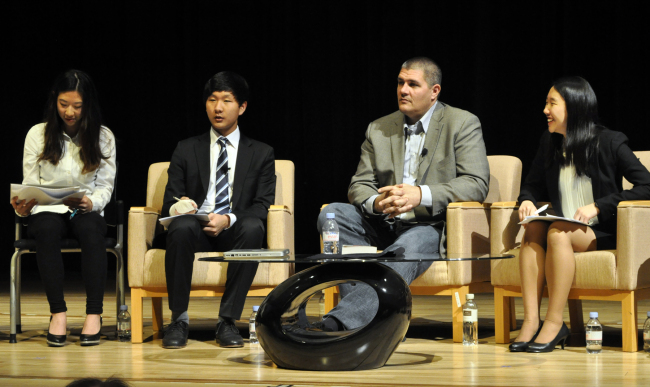Observing ‘voiceless society’ via fragments of reality
Pulitzer-winning novelist Adam Johnson strives to capture human side of N.K.
By Yoon Min-sikPublished : March 9, 2014 - 20:17
Adam Johnson, the author of Pulitzer prize-winning novel “The Orphan Master’s Son,” called North Korea “the most voiceless society on Earth.”
“It is difficult to write about North Korea. Nothing you write can be confirmed,” he told The Korea Herald, before having a discussion about his book with the students at Chadwick International in Incheon. “North Koreans aren’t allowed to speak for themselves.”
The resounding silence from the hermit kingdom is what pushed Johnson, an American with a limited knowledge of Korea, to write a book about the country. He aimed to put a human face on North Korea, a tall order considering the scarcity of research material.
“It is difficult to write about North Korea. Nothing you write can be confirmed,” he told The Korea Herald, before having a discussion about his book with the students at Chadwick International in Incheon. “North Koreans aren’t allowed to speak for themselves.”
The resounding silence from the hermit kingdom is what pushed Johnson, an American with a limited knowledge of Korea, to write a book about the country. He aimed to put a human face on North Korea, a tall order considering the scarcity of research material.

“One of the difficulties was that the only human stories we have are from defectors with darker stories,” he said. “I wondered what it was like to be a normal North Korean.”
In the book, many characters are identified through their roles, rather than their names. This, Johnson said, shows the insignificance of the individual in North Korea.
“In the West, people are the central figures. In North Korea, you’re a secondary character in Dear Leader’s life,” he said, referring to Kim Jong-il, the deceased former ruler of the country.
He likened the dehumanization process to the efforts of the authoritarian government in Cambodia in the 1970s.
“They would take your entire life story, bend it to serve the Khmer Rouge,” he said. “Like skinning a person, they would separate the story and the human. They kept the story, and disposed of the human.”
This is what happens to one of the characters in the book, who is literally transformed into a different person. When a story contradicts the reality, Johnson said, it is the story that survives.
During a trip to North Korea, he heard that when a person rises to power and wants to have an ancestor buried in the Martyrs’ Mausoleum, a fake heroic story is created about the ancestor. The prominent person’s ancestor takes the place of a less powerful person’s ancestor, for whom a new story is written.
Although his testimony cannot be verified, the way North Korea swiftly erased records of North Korean leader Kim Jong-un’s once-powerful uncle Jang Song-thaek suggests Johnson’s take is not far from the truth. The narrative, serving the purpose of the country, outweighs the importance of living individuals.
“National stories are ridiculous; Kim Jong-il was born under a double rainbow, there was a new star on Baekdusan Mountain,” he said. “Everyone knows that story’s a lie, but it must be an absolute fact.”
Students also acknowledged the difficulty of understanding North Korea. “That country is basically ruled by one man. We don’t know what he is going to do next. To approach (Pyongyang) only with a political view or humanitarian view seems a little naive,” said 10th grader Hwang Ji-min.
The love-hate relationship between the co-inhabitants of the Korean Peninsula complicates matters further.
Because of the touchy political situation, some hesitate to openly criticize the secluded country. One of the students said that even though she noticed the dark dystopian satire embedded within the text, she was reluctant to openly laugh about it.
Another Chadwick student, Daniel Ku, said that through a conversation with his father he came to feel that North Koreans were “distant cousins.” As last month’s tearful family reunions attest, South Koreans have long viewed Northerners as long-lost kin, despite the ideological differences and military confrontations.
It appears, however, that the gap between the Koreas is widening. According the Institute of Unification Education, the percentage of teenagers who said unification was essential went from 85 percent in 1997 to 57.3 percent in 2010.
“Even though we speak the same language, our culture is different. I don’t know if we can still call it the same Korea,” said Hwang Ji-min.
To fully understand North Korea, its former and current residents must come out of their shells to address the world, Johnson said. But this is unlikely to happen overnight, he added.
“When North Koreans come out (of Korea), they are traumatized. They’re isolated and they’re cut off from everything they know,” he said, calling North Korea a “trauma narrative on a national scale.”
“North Koreans will tell their stories, but in time.”
By Yoon Min-sik (minsikyoon@heraldcorp.com)



![[Herald Interview] 'Amid aging population, Korea to invite more young professionals from overseas'](http://res.heraldm.com/phpwas/restmb_idxmake.php?idx=644&simg=/content/image/2024/04/24/20240424050844_0.jpg&u=20240424200058)














![[KH Explains] Korean shipbuilding stocks rally: Real growth or bubble?](http://res.heraldm.com/phpwas/restmb_idxmake.php?idx=652&simg=/content/image/2024/04/25/20240425050656_0.jpg&u=)

